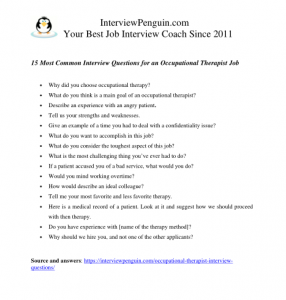In most cases, the hiring will try to find out two things while talking to you. First one, whether you have theoretical knowledge of occupational therapy, and are ready to handle the job from day one in the office. Secondly, whether you have the right attitude to work, and the right personality for this type of work.
They will choose their questions accordingly, but they will also observe the way you gesticulate, shake hands, and basically conduct yourself in an interview–your non verbal communication. It helps them to understand you as a person, and to verify the authenticity of your words (how motivated you are to make a positive difference in the life of your patients, and so on). Let’s have a look at the questions you may face, and then we will also look at some specifics of this interview.
Table of Contents
Why do you want to work as an occupational therapist?
You can talk about your passion for this type of work, or about your desire to help. If your childhood experience motivated you to pursue this career–for example you were a patient and you had a good experience with a therapist, or someone from your family had the job, feel free to speak about the experience.
Just like everyone else, interviewers enjoy hearing a good story. If such a story preceded your decision to study occupational therapy, you should definitely share it with them in the interviews.
What do you want to accomplish as an occupational therapist?
You have a couple of options for a good answer here. First one is saying that you want yo help patients to develop, recover, and improve the skills needed for daily living and working, simply helping them get back on track after an injury, or after any other issue they faced.
Second one is referring exactly to the target group of patients you will work with in your new job–be it children, elderly, people experiencing symptoms after recovering from covid-19, prisoners, or any other group you’ll work with. In such a case, you can talk about particular problems you will help them to address, and methods you will use to do so with your target group.
Third option is saying that you do not dream about any big accomplishments. You simply want to try your very best, with each and every client.
Tell us about a time when you had to work with an angry patient (or a difficult client).
The key is to show understanding for their emotions. Narrating the situation, you should ensure the interviewers that you tried your best to stay calm and attentive to their needs, since you understand that it is natural to get emotional or even angry or desperate when one battles some unpleasant diagnosis, and for example does not see much progress.
If it is your very first job application, and you lack any clinical practice, you can always say what you would do when dealing with a difficult patient. At the end of the day, your attitude matters for the interviewers, and not the situation you narrate.
Tell us about a time when you had to deal with a confidentiality issue.
You can narrate a situation when you felt a strong urge to talk about your patient, and what they experienced, since you found it very difficult and battled with it emotionally–you had to share the story with someone, explaining how you felt.
But ensure the interviewers that you didn’t lose your integrity, and did not reveal the name of the patient, or any other personal details that would help your confidant discover the identity of the patient in question. You can also emphasize the importance of maintaining all records and information about the patients securely, be it offline or online…
What do you consider the toughest aspect of this job?
Perfect jobs do not exist. To enjoy the great things a career of an occupational therapist offers us, we have to handle also the difficult aspects of the job.
One of the most difficult things is perhaps coping with disappointment–when we do our best and still can’t help the patient to recover their strength or full range of movement. To work with heavy and overweight patients is another tough task, this time physically.
The most important here is to show them that you see the job realistically, and do not expect to do miracles with all of your patients–though you may do miracles with some of them…
What would you do if a patient accused you of a bad service?
Once again, you should show your understanding for the feelings the patients are going through. Say that you would try to understand their perspective, and improve your service–if possible.
The key is to show them that you won’t overreact. Sure enough, it is painful when we try our best and someone accuses us of bad service. But at the end of the day everyone can make a mistake. Tell the interviewers that you plan to take each feedback seriously. If clients are not satisfied, you will try to learn from the situation, and do things better next time.
What is your most favorite and least favorite therapy?
Regardless of your choice, you should ensure the interviewers that you understand the importance of various therapy methods, and always choose the one to apply according to the condition and needs of the patient, and not according to your personal preferences.
Emphasize the individual approach to each patient, because that’s what they want to here from you at this point.
Do you have experience with [name of the therapy method]?
They may ask about a specific therapy method they use at their clinic, or even about some innovative method. Simply a method they would like to use and hope you can bring this experience onboard.
If you worked with the method, you should add numbers and examples to your answer, for more credibility. To say that you’ve worked with this or that method in 2020, and applied it on a daily basis for this and that condition, is a much better answer than just saying that you know the method, or that you have experience with it.
If you do not have experience with method they ask about, ensure them that you strive to become the best occupational therapist you can be, and are looking forward to learning how to apply new therapy methods.
Some other questions you may face in your occupational therapy job interview
- How would describe an ideal colleague?
- Tell us about the biggest setback you’ve experienced in your work with patients.
- Why should we hire you, and not one of the other applicants?
- Here is a medical record of a patient. Look at it and suggest how we should proceed with then therapy.
- What does integrity mean to you?
- Where do you see yourself in 5 years from now?
Final thoughts, interview tips
Nurse, physical therapist, occupational therapist, teacher … these titles are not merely jobs you can have. They are something more. Anytime you speak about your work, your patients, your daily duties, and things you try to achieve with your work, speak about them with enthusiasm and love.
Show your interviewers that you care, that you do not apply for a job only because you need money to live, or because you have graduated from the field. Positive attitude, and understanding of the meaningful purpose of your work, will take you a long way in this interview. Keep it on your mind while preparing to meet the hiring managers…
To sum it up, interview for a job of an occupational therapist belongs to easier interviews. You won’t compete with many other people for the job, unless you apply at a prestigious clinic, or a nursing home that pays exceptionally well. Still, you have to demonstrate your readiness for the job, right attitude to work, and your motivation to do the most for the patients.
Practice your interview answers, do a good research about your new place of work, and do not forget to check also the following articles:
- How to dress for an interview – Choose the right clothes and make a long-lasting impression on the hiring managers.
- Salary negotiation tips – Get as much as deserve when it comes to money-talk in your interviews.
- Behavioral interview questions – You can definitely face some tough behavioral questions in your occupational therapist interview. Learn how to answer them.
* You can also download some questions in a one-page .PDF document, and practice your answers anytime later:



